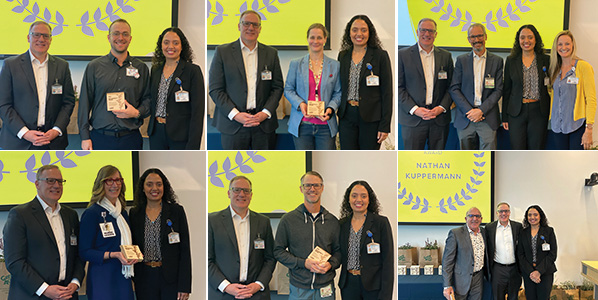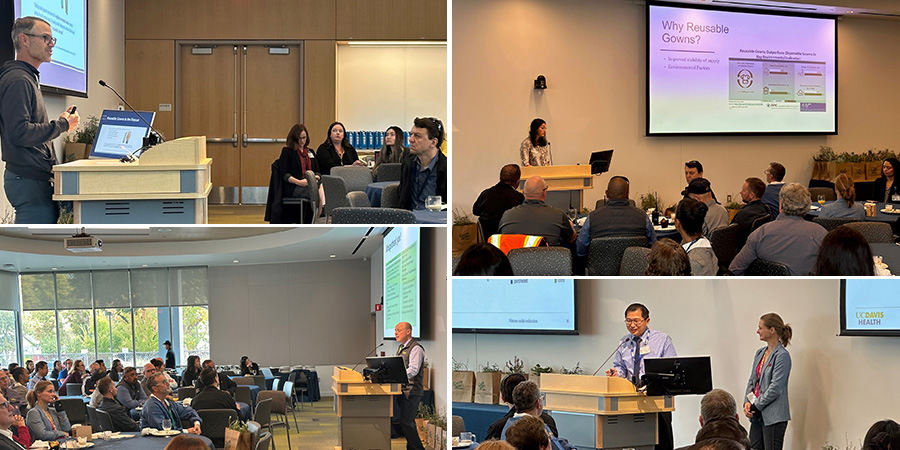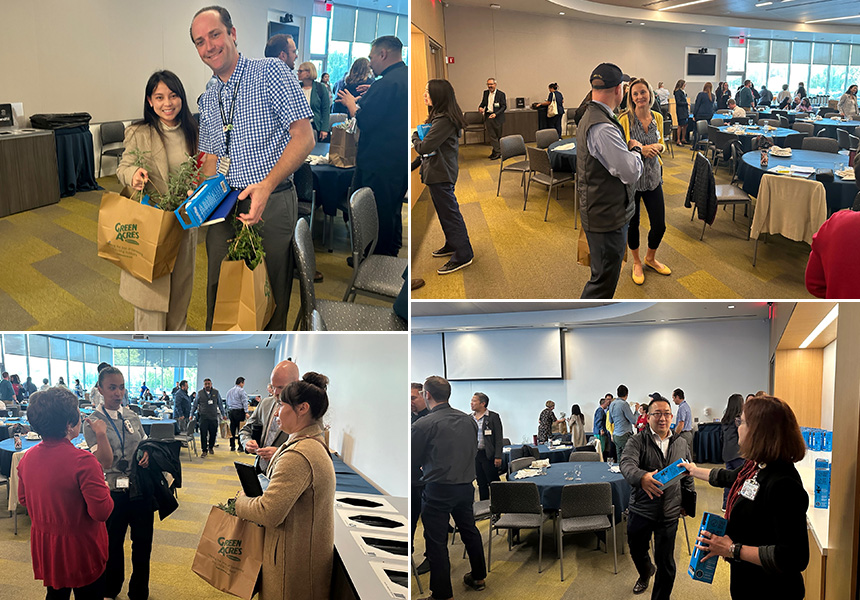Sustainability Summit recognizes accomplishments, looks ahead to a healthier campus
Originally published by UC Davis Health
Read more
(SACRAMENTO) Walking into North Addition Office Building Room 1001 on the morning of Nov. 13, guests at the UC Davis Health Sustainability Summit were greeted with a beautiful display of juice, chicken apple sausage, jalapeno-infused eggs and more.
Only fitting, the summit began with remarks from Food and Nutrition Services’ Santana Diaz, director of Culinary Operations and Innovation, and FNS manager Wendi Vela, who discussed UC Davis Health’s creation of sustainable nourishment within the organization. Also fitting, the summit that began with discussions of food, while nearly 100 individuals metaphorically broke bread with each other, would also later end on the topic of food.
But more on that in a bit.
What does sustainability mean to you?
While folks continued to nibble on breakfast bites, Jita Buño, Associate Chief Operating Officer, and Michael Condrin, Interim Chief Administrator and Chief Operating Officer, introduced the Sustainability Awards – the main course of the summit.
One by one, the sustainability-focused accomplishments of Nathan Kuppermann, David Barnes, Nina Schloemerkemper, Andrew Hernandez, Barbara Gumnor and William Pevec were read to the audience. Each champion rose to applause and accepted their sustainably created plaque.

Bottom, left to right: Barbara Gumnor, David Barnes, and Nathan Kuppermann.
UC Davis Health Sustainability Director Kristina Cullen then rolled the video, “Sustainability on the Streets.”
In the video, Cullen and Sustainability Officer Sarah Janus asked UC Davis Health employees, “What does sustainability mean to you?” The responses of participants ranged from simple, yet logical, to serious and silly. Looking around, the live audience watched with a mix of inquisitive looks, deep thinking, smirks, and smiles that seemed to say either “what a fun video” or “hey, I know that person!” Several answers received nods of agreement, with one in particular leading an audience member to shout, “YES!”
The video ended with Michael Godfrey of Transportation and Parking Services simply responding, “bees,” much to the room's delight, who laughed and erupted with applause.
Next, champions were once again invited to share their sustainability projects, the background, the implementation and the results of their work.

Virpal Donley and Barnes discussed UC Davis Health’s efforts to reduce PPE plastic waste by implementing reusable isolation gowns. Barnes pointed out UCLA Health’s savings once the organization switched from disposable to reusable.
“I’m not going to stand by and let UCLA kick our butts,” Barnes smiled. “They saved $1 million in their first year, so the challenge is on; the gauntlet is thrown down.”
Schloemerkemper highlighted the use of nitrous oxide, known as laughing gas. She said its use was “not an environmentally laughing matter” because it destroys the ozone layer.
Albert Huang presented his discoveries about finding and fixing gas leaks with help from Plant Operations and Maintenance. His ear-to-ear smile as he produced evidence of a 30% reduction – overshooting the goal of 5% - makes it easy to feel how proud he is.
Dan Mendonsa of PO&M, Joleen Lonigan and Gumnor of Clinical Practice, Tom Ocheltree of Environmental Health and Safety and Julianna Moore from EVS, and Janus from the Green Commuter Program, shared how their teams are making changes around campus – from replacing lighting to reducing packaging, more transparent recycling programs to new commuter options.
Each statement might have been perceived as too small to have an impact, too difficult to begin, or too scary to pursue solo.
What affects the whole planet
Kuppermann shared a story that perfectly put each fear in the garbage.
Speaking about his father’s boss, two-time Nobel Prize winner Linus Pauling, Kuppermann said: “(Pauling) realized that all the above-ground nuclear testing that was occurring over the South Pacific Ocean was dangerous to the Earth, and it needed to stop. So, he paused his own scientific work to protest what he saw and he picketed, at first by himself. Then four scientists joined in. Then it was 10, then many more. Pauling was called to Congress, and he spent one year testifying about the harms of above-ground nuclear testing, and testing went underground.”
“The point is,” Kuppermann said, “what we do here is important but sometimes we must stop and think about what affects the whole planet. If we don’t treat this thing, there will be no patients to treat.”
Nearing the end, Cullen called on the audience for questions.
Pevec inquired about UC Davis Health’s on-campus gas-powered turbine. Mendonsa responded with the organization’s four-phase plan to transition from “dirty gas to clean gas to all green.” Cullen asked about transit options like the new Elk Grove bus for staff who live along the Interstate 80 corridor. Janus shared that the power lies in the hands of staff. If employees continuously ask for this option and prove the Elk Grove bus line works well, the need for other options will become crystal clear. Trash cans and plastic bags were discussed. The conversation turned to psychology and human behavior.
And then it’s back to food – full circle.
A participant pointed out that much of the summit examined the reduction of PPE waste and gas omissions and less about food waste. Two hours after handing the microphone off, Diaz took it a second time and pointed to the tables of food in the room.
“None of this food is going into the garbage,” he said. “It’s being diverted to the Cal Soil Program, which is not compost, it’s upcycling. It’s turned into pet food or fertilizer, which has been shown to increase crop yields by 30% without using pesticides. It’s a challenge, but we’re being more responsible with what’s left over.”
The summit officially ended, yet the participants chose to stay, breaking into small groups and continuing discussions and sharing ideas.

What can we do?
Kirsten McCullough, an assistant nurse manager in pediatrics, and Jasmine Yumiaco-Marsh, a nurse manager in pediatrics, sat talking about the Summit.
“I thought this was very informative,” Yumiaco-Marsh said. “There were some sustainability issues I wasn’t even aware of, like, I didn’t even know some of these things were something we were implementing. (Many things) align with where our program is headed.”
“If we can do something to create a better environment, then I’d love to be a part of it,” McCullough said. “It made me think, what can we do on our own unit?”
And that is precisely what UC Davis Health sustainability champions such as Cullen, Janus and their team hoped for and what Kuppermann described. People being so inspired by the Sustainability Summit that they ultimately lead the charge and advocate for change within their teams and units, thus snowballing into a larger, organizational-wide effect that can lessen the impacts of global warming and create a healthier environment for everyone.
